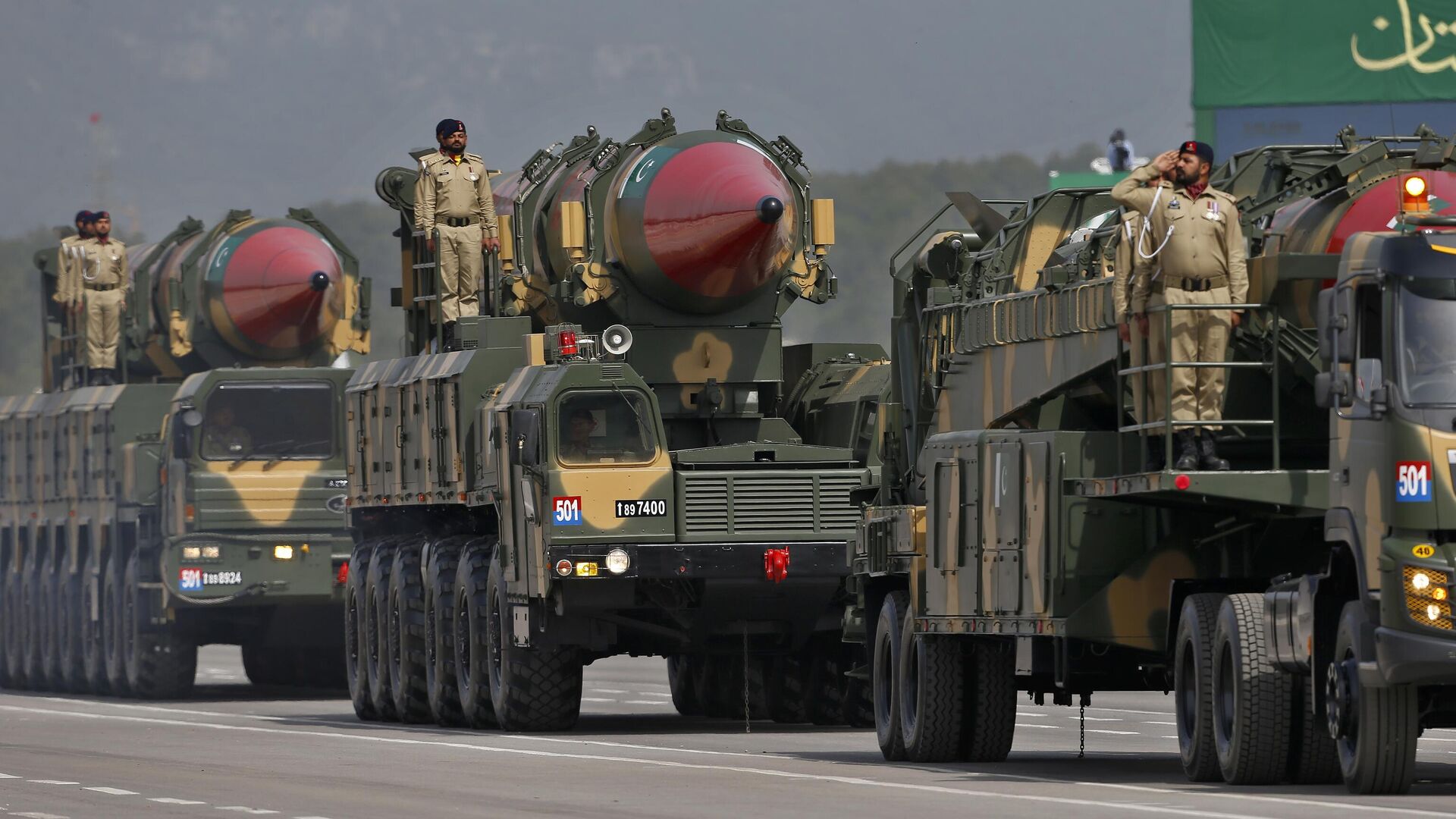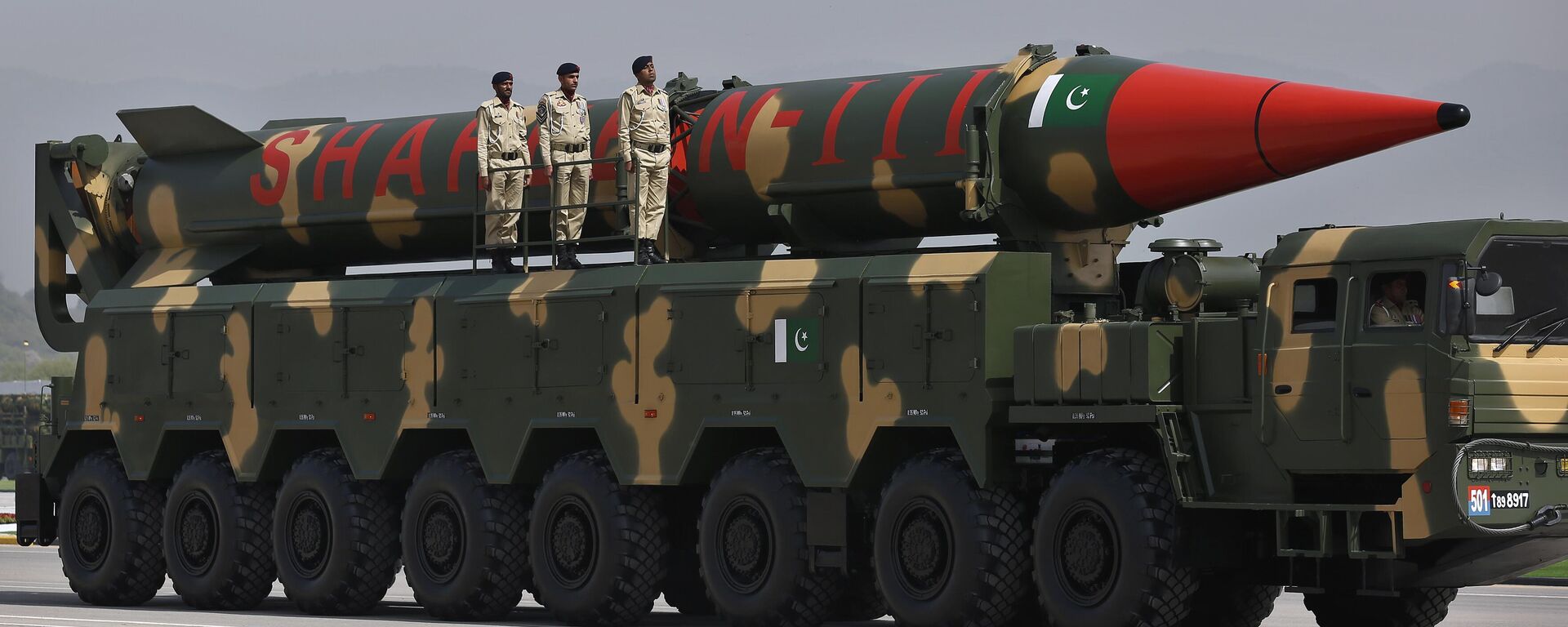https://sputniknews.in/20230316/pakistan-wont-compromise-on-nuclear-program-to-revive-imf-deal-minister-1193202.html
Pakistan Won’t Compromise on Nuclear Program to Revive IMF Deal: Minister
Pakistan Won’t Compromise on Nuclear Program to Revive IMF Deal: Minister
Sputnik India
Pakistan Prime Minister Shehbaz Sharif said this week that an agreement with the IMF will be reached “within a few days” as the country has fulfilled even the... 16.03.2023, Sputnik India
2023-03-16T16:30+0530
2023-03-16T16:30+0530
2023-03-16T16:30+0530
pakistan
imf loan
economic crisis
shehbaz sharif
defenсe news
nuclear weapons
south asia
missiles
https://cdn1.img.sputniknews.in/img/07e7/03/10/1193696_0:160:3073:1888_1920x0_80_0_0_b3115dab8c839d083578307d670e96ff.jpg
Pakistan Finance Minister Ishaq Dar said that the government won’t compromise on either its nuclear weapons or missiles program in order to revive the bailout deal with the International Monetary Fund (IMF) on Thursday.Rabbani, a senator of the Pakistan People’s Party (PPP), also warned that Islamabad should keep “other forces” from indulging in the internal affairs of Islamabad. Speaking about the delay in finalizing the ninth review of the IMF, Dar said that Islamabad has been involved in extensive engagements with the western lender which have been "unusual, too lengthy, too long, too demanding."The Pakistani government is currently awaiting a $1.1 billion tranche from the IMF, which is part of a larger $7 billion loan facility signed in 2019. While the talks in February yielded no substantial progress, IMF funds are crucial for Islamabad as it battles a balance-of-payments crisis, being left with only enough foreign reserves to sustain a month of imports.Concerns Over Pakistan’s Nuclear Program In February, Rafael Grossi, director general of International Atomic Energy Agency (IAEA) visited Pakistan, with the two sides agreeing to “increase collaboration” in peaceful applications of nuclear science. Grossi met Pakistan’s Prime Minister Shehbaz Sharif and Foreign Minister Bilawal Bhutto Zardari during his visit. An IAEA statement said that “nuclear safety” was one of the issues discussed in the talks. However, the visit led to speculation about the safety of Islamabad’s nuclear weapons program, prompting a clarification from the Prime Minister’s Office. Pakistan is one of nine countries to possess nuclear weapons and has the capability to deliver them through aircraft and land-based missiles, as per Stockholm International Peace Research Institute (SIPRI).However, the country isn’t a signatory to the Nuclear Non-Proliferation Treaty (NPT).
https://sputniknews.in/20221219/when-did-pakistan-get-nuclear-weapons-35689.html
pakistan
south asia
Sputnik India
feedback.hindi@sputniknews.com
+74956456601
MIA „Rossiya Segodnya“
2023
Dhairya Maheshwari
https://cdn1.img.sputniknews.in/img/07e6/0c/13/138962_0:0:641:640_100x100_80_0_0_2cb44360dbcdf6d84bf4b299cd045917.jpg
Dhairya Maheshwari
https://cdn1.img.sputniknews.in/img/07e6/0c/13/138962_0:0:641:640_100x100_80_0_0_2cb44360dbcdf6d84bf4b299cd045917.jpg
News
en_IN
Sputnik India
feedback.hindi@sputniknews.com
+74956456601
MIA „Rossiya Segodnya“
Sputnik India
feedback.hindi@sputniknews.com
+74956456601
MIA „Rossiya Segodnya“
Dhairya Maheshwari
https://cdn1.img.sputniknews.in/img/07e6/0c/13/138962_0:0:641:640_100x100_80_0_0_2cb44360dbcdf6d84bf4b299cd045917.jpg
pakistan nuclear weapons, pakistan nuclear test, pakistan nuclear program, pakistan imf talks, pakistan imf news, pakistan imf bailout, pakistan imf loan, pakistan imf conditions, pakistan imf deal, pakistan economy, pakistan economic crisis, pakistan economy news
pakistan nuclear weapons, pakistan nuclear test, pakistan nuclear program, pakistan imf talks, pakistan imf news, pakistan imf bailout, pakistan imf loan, pakistan imf conditions, pakistan imf deal, pakistan economy, pakistan economic crisis, pakistan economy news
Pakistan Won’t Compromise on Nuclear Program to Revive IMF Deal: Minister
Pakistan Prime Minister Shehbaz Sharif said this week that an agreement with the IMF will be reached “within a few days” as the country has fulfilled even the “toughest of conditions”.
Pakistan Finance Minister Ishaq Dar said that the government won’t compromise on either its nuclear weapons or missiles program in order to revive the bailout deal with the International Monetary Fund (IMF) on Thursday.
"I believe in transparency and fiscal discipline. Let me assure you that nobody is ready to compromise on the nuclear or missile program of Pakistan,” Dar said, responding to a suggestion from Pakistani Senator Raza Rabbani, who earlier indicated the IMF wanted Islamabad to “soften” up its nuclear program.
Rabbani, a senator of the Pakistan People’s Party (PPP), also warned that Islamabad should keep “other forces” from indulging in the internal affairs of Islamabad.
Speaking about the delay in finalizing the ninth review of the IMF, Dar said that Islamabad has been involved in extensive engagements with the western lender which have been "unusual, too lengthy, too long, too demanding."
Islamabad has met all of IMF's conditions but the Washington-based lender was now shifting goalposts and urging “friendly” countries to fulfill their aid commitments to Pakistan, he added.
The Pakistani government is currently awaiting a $1.1 billion tranche from the IMF, which is part of a larger $7 billion loan facility signed in 2019. While the talks in February
yielded no substantial progress, IMF funds are crucial for Islamabad as it battles a balance-of-payments crisis, being left with only enough foreign reserves to sustain a month of imports.
Concerns Over Pakistan’s Nuclear Program
In February, Rafael Grossi, director general of International Atomic Energy Agency (IAEA) visited Pakistan, with the two sides agreeing to “increase collaboration” in peaceful applications of nuclear science.
Grossi met Pakistan’s Prime Minister Shehbaz Sharif and Foreign Minister Bilawal Bhutto Zardari during his visit.
An IAEA statement said that “nuclear safety” was one of the issues discussed in the talks. However, the visit led to speculation about the safety of Islamabad’s nuclear weapons program, prompting a clarification from the Prime Minister’s Office.
“Pakistan’s nuclear and missile program is a national asset, which is jealously guarded by the State. Complete program is totally secure, fool-proof and under no stress or pressure, whatsoever,” the PM’s statement said.
Pakistan is one of nine countries to possess nuclear weapons and has the capability to deliver them through aircraft and land-based missiles, as per Stockholm International Peace Research Institute (SIPRI).
However, the country isn’t a signatory to the Nuclear Non-Proliferation Treaty (NPT).



